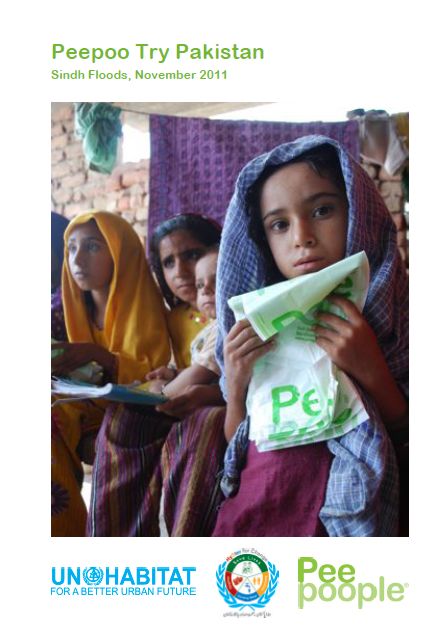
Published in: 2011
Publisher:
UN-HABITAT, Pakistan
Author:
Naeem, K., Berndtsson, M.
Uploaded by:
SuSanA secretariat
Partner profile:
common upload
13822 Views
75 Downloads
Location of library entry
Content - Summary
Climate change is becoming evident in countries like Pakistan where frequent natural disasters have been experienced in the recent years. In Pakistan alone, 20 million people were affected by floods in 2010, and 5 million more in 2011. In many emergency situations access to adequate sanitation is one of the strongest determinants of survival by people directly affected.
Many times, especially in difficult contexts such as floods, humanitarian actors lack viable solutions and sufficient capacity to ensure that those who are directly affected have access to adequate sanitation. New innovative sanitation solutions are urgently needed to change the current situation that accounts for such a heavy toll on human life, especially for the most vulnerable, women and children.
In this context UN-HABITAT Pakistan decided to trial and evaluate the innovative Peepoo sanitation solution as an emergency sanitation solution and catalyst for behavioural change in the 2011 floods in Sindh. The purpose of the trial was to demonstrate Peepoo’s viability, acceptance, effectiveness and benefits as an emergency response solution for Pakistan. To demonstrate the Peepoople Humanitarian Response Model Peepoople has developed Peepoo Try, a small-scale trial for 10 families during 10 days. This method was used for the trial and two flood-affected villages in Sindh region, Ali Achar Rind and Lal Bux Rind, were selected. In total 10 families and 71 persons participated in the 10-day trial, of which about 50% were female and 50% male, 50% below 15 years of age and 50% above.
The overall conclusions from the Peepoo Try in Sindh were very positive. UN-HABITAT Pakistan concluded that the Peepoo is a viable and cost- and resource effective emergency response sanitation solution for Pakistan, bringing many benefits such as immediate disease control, rapid implementation, high user acceptance, flexibility and safety for women and children. Also noted was Peepoo’s potential to act as a catalyst for behavioural change of sanitation practices to help end open defecation, acting as a transition solution into the recovery phase and bridging into development.
The Peepoo was easily accepted and positively received by the flood affected communities. It was quick to implement as well as easy to understand and use. All people who participated in this evaluation were generally satisfied with the solution and wanted to continue using it. In particular women and children appreciated having easy access to a clean and personal toilet at family level at all times. However, Peepoo use without proper facilitation is not possible in a community.
Bibliographic information
Naeem, K., Berndtsson, M. (2011). Peepoo Try Pakistan - Sindh Floods (November 2011). UN-HABITAT, Pakistan
Filter tags
East Asia & Pacific Emergency and reconstruction situations (WG8) English Rural Urban informal settlements (slums)















